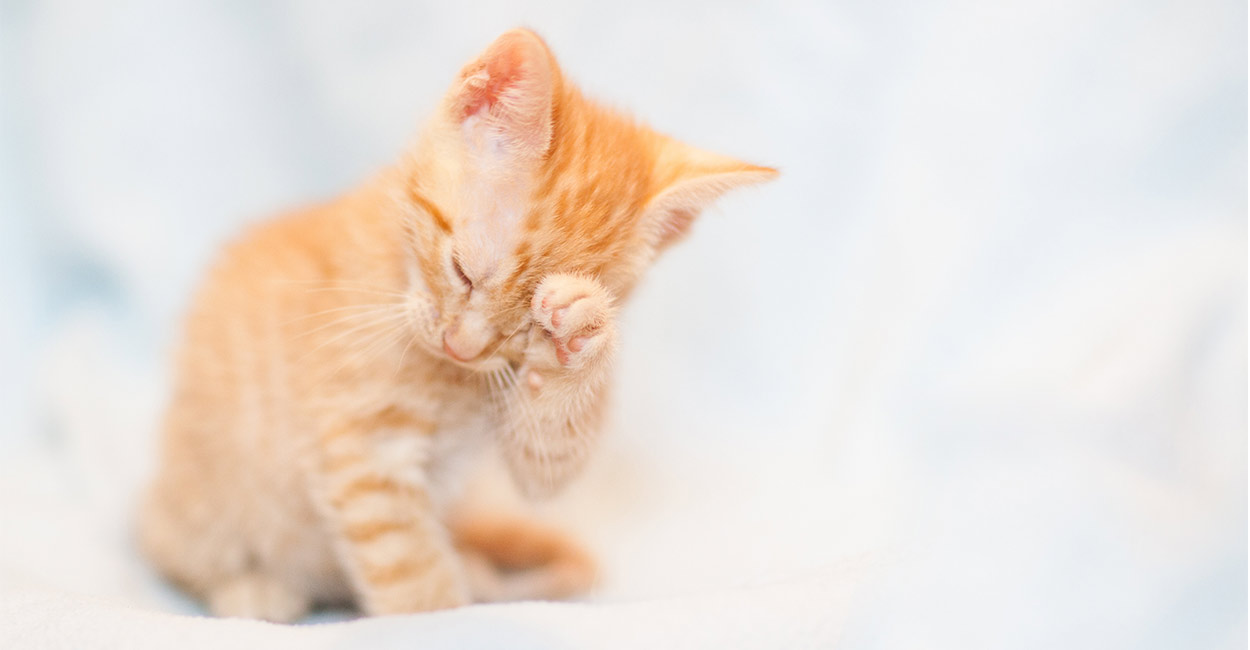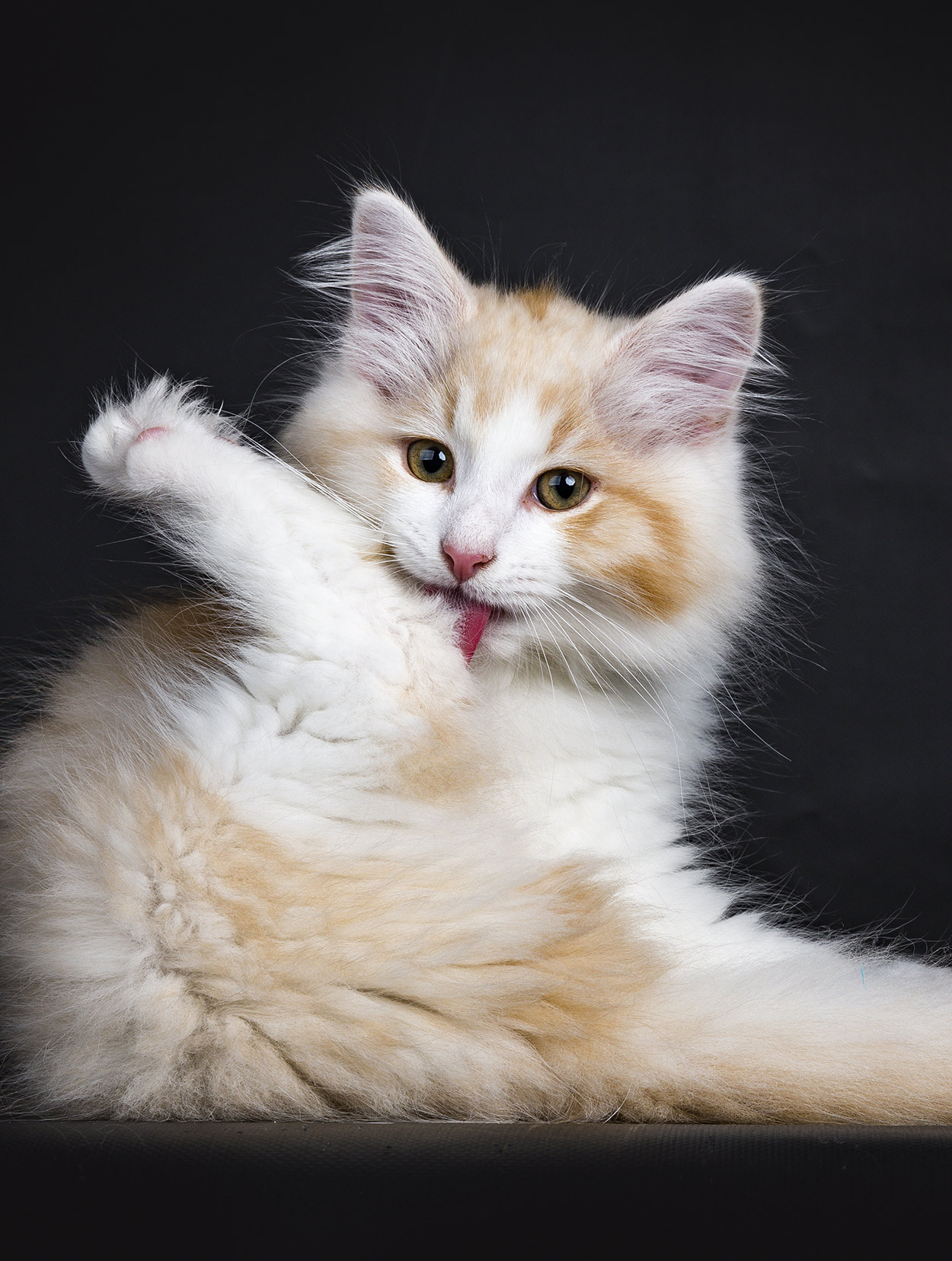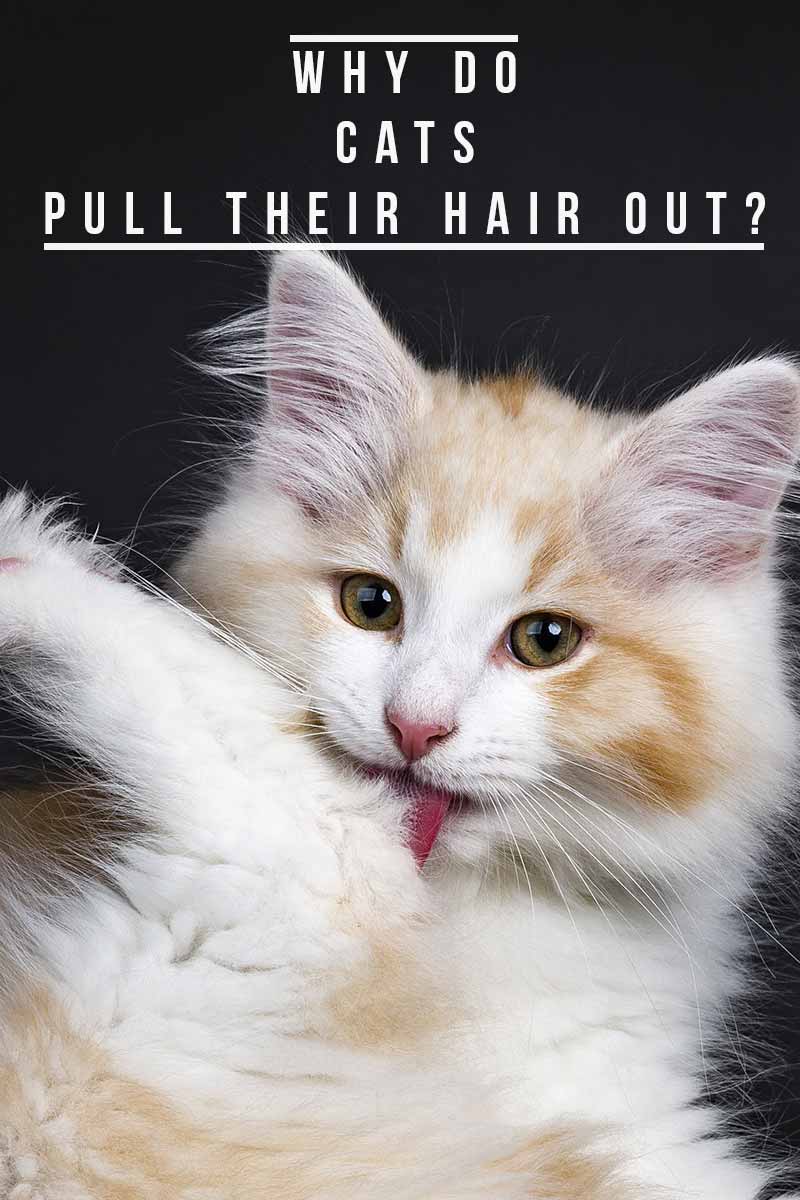
Cats pull their hair out in clumps or on their tails more frequently than most people realise. Sometimes this behavior is accompanied by visible weight loss, but often it’s the only sign that something is wrong. Most of the time it’s a result of pain, allergies or a skin problem. But occasionally this can be purely a behavioral issue.
Contents
Allergies Can Make Cats Pull Their Fur
Our cats’ skin is one great big sensory organ and when it gets itchy it encourages them to either bite, chew, scratch it, or pull out the hair. The most common cause of cats that are pulling their hair out is the itch that occurs in those that have an allergy to flea saliva. This is called flea allergic dermatitis.
When a flea bites their skin, it irritates them and causes intense itching. This in turn encourages the cat to groom in response, and this then creates an itch/scratch cycle.
Many of the ‘off the shelf’ flea treatments aren’t as effective as those prescribed by veterinarians. And even the best treatments won’t keep those pesky critters at bay if they’re not applied consistently.
Cats that have never put a paw outside should also be regularly treated for fleas. Whilst they might not pick them up directly, anyone coming into the house is capable of bringing fleas in with them on their shoes.
At the same time, it’s essential to treat the house with an effective household flea product, making sure you spray right up to the edges of carpets. It’s also a good idea to regularly check for signs of flea excreta on the cats themselves and on their bedding.
Cats with Itchy Skin
Cats can also develop sensitivities to certain foods, pollens, trees and plants and even house dust mites – all of which can cause cats to pull out their hair as a way of dealing with their itchy skin. Allergies such as these are more likely in middle-age to younger cats.
Less common reasons for cats having itchy skin are bacterial infections as well infections such as ringworm. Ringworm is caused by a fungus that can grow on the cat’s skin and which uses the skin hair and nails as a source of nutrition.
Despite its name, it has nothing to do with worms!
Some skin cancers can also cause irritation that drives cats to groom and chew excessively, often making things much worse. Itchy skin can also be a side-effect associated with some medications.

Cats in Pain Pull Their Hair
The other main reason why cats pull their hair out is pain. Pain such as that created by an injury (old or new) can motivate cats to pull out their hair on or around the area which is causing the pain.
Pain is also associated with common cat diseases such as osteoarthritis. This is usually prevalent in senior cats who are more likely to suffer from painful joints.
Diseases of the bladder can also be very painful and is another common reason why you might see cats pulling their hair out. In these instances, they will excessively groom the areas around their abdomen. There are a number of bladder diseases that can affects cats in this way:
Feline Urethral Obstruction
This is where something blocks the urethra of male cats (ie the tube which runs from the bladder to the penis) and prevents them from urinating. This can be a life-threatening disease if not spotted and treated early.
Cystitis
Also known as Feline Lower Urinary Tract Disease. This is a painful condition that recent research has shown, has a direct association with stress.
Feline Hyperaesthesia Syndrome
Also known as ‘Rippling Skin Syndrome’ this is a recently identified but poorly understood condition. One where cats exhibit exaggerated responses to touch and have sudden bouts of intense grooming, self-mutilation or tail chasing.
Cats Experiencing Stress
There are some diseases which have a direct relationship with stress. This is where things can get a bit confusing. Because some of the physical conditions described above can be exacerbated or even triggered by prolonged periods of stress. Especially in already anxious cats that aren’t very good at dealing with life’s everyday challenges.
When cats are chronically stressed they are constantly releasing stress hormones and this can affect their immune response causing their skin to become particularly sensitive.
So, not only does the skin become itchier, making cats more likely to pull out their hair, but the stress is also likely to make any underlying physical condition or disease much worse.
Certain Breeds Are Prone To Hair Pulling
Certain breeds of cat appear to be more likely to pull their hair out than others.
These include pure-breed oriental cats, especially Burmese and Siamese, along with more recent breeds such as Bengal cats.
It is thought that these breeds may be genetically predisposed to the behavior.
However, these also happen to be highly energetic, intelligent and sensitive breeds that may pull their hair out as a result of being kept in environments that don’t necessarily offer them the level of stimulation they require.
Environmental Factors
Cats are the ultimate control freaks – they thrive on consistency and predictability. So, any deviations from their normal routine might trigger episodes of stress.
Upheavals such as the extended absence of their owner, building work inside or outside the home, the arrival of a new baby, and conflict with other cats are all highly significant and upsetting events for our cats.
Even the death of a feline housemate with whom they shared a close bond can trigger a stressful period of mourning.
So, when they happen, cats might turn to a predictable and satisfying activity that they can control, such as pulling their hair out.
In most cases cats experiencing stress will show additional symptoms. Behavior such as hypervigilance, hiding, feigning sleep, avoiding contact with people and other cats. There might also be a reduction or increase in eating.
What to Do If Your Cat Is Pulling His Hair Out?
Irrespective of the cause, in all cases where cats are pulling their fur out, and in many cases swallowing it, it is imperative that they are examined by a veterinarian.
Where is the Cat Pulling its Hair Out?
Where on their bodies cats choose to pull their hair out is usually very significant. Most hair pulling in response to itchy skin creates a symmetrical pattern of baldness or damaged hair on those areas that cats can comfortably reach on both sides.
For example, you might see cats pulling hair out of both their back legs or pulling hair out on both sides.
Other signs that cats are itchy include the skin appearing to ‘tick’ and the fur to ripple. You might see an increase in rubbing, rolling, scratching and licking activities. Or you may also notice their hair feels sharp where it has been broken off.
Hair pulling in response to pain, whether due to injury or disease, is usually unilateral. This means focussed on one site where the pain is felt.
Finding Clues in the Location
Pain from any of the bladder diseases mentioned earlier may cause cats to pull their hair out around their lower abdomen or on the inside or underside of their thighs. Where male cats compulsively lick ‘down there’ as a new habit, it’s important to take a closer look.
Male cats rarely show their private parts. If their penis is sticking out, then this could be an indicator of Feline Urethral Obstruction.
This may be accompanied by other symptoms such as lethargy, crying out when picked up, blood in the urine, being unable to urinate and vomiting.
If you notice any of these symptoms, contact your veterinarian immediately.
Is There a Pattern to the Behavior?
The pattern of the behavior can also give some important clues as to what could be causing it. If the behavior is usually worse in the spring and summer and resolves in the winter months this could indicate an allergy to harvest mites, pollens, trees or plants.
Conversely if the behavior only appears during the colder months, it could be a symptom of boredom or frustration.
My Siamese cat Billy sucks the tip of his tail throughout winter. A habit he’s got into a result of not wanting to take advantage of the great outdoors and all the stimulation it has to offer, albeit cold and wet. So, for at least three months of the year I regularly have to put up with being smeared by a wet and gooey tail!
What Happens Next?
Providing your veterinarian with as much detailed information as possible from your observations of the behavior. As well as any relevant background information should help speed up the process of finding a diagnosis.
Having taken a history, your vet will give your cat a general physical examination to locate any areas of pain. As well as a dermatological examination, to identify any areas of lesions or hair loss and how they’re distributed.
Further investigations may be necessary including blood tests, skin biopsies, allergy screening and analysing the cat’s urine.
Referral to a specialist veterinary dermatologist may be required.
In the absence of any medical cause the vet might then refer you to a cat behavior specialist.
Treatment Options
The most effective treatment is usually based on a combination of veterinary and behavioral intervention.
Veterinarians will treat any underlying disease that is causing dermatological or pain related hair pulling.
At the same time, a behaviorist will put in place a programme focused on making changes to the cat’s environment and social interactions. Aiming to remove any stress that could be contributing to the behavior.

My kitty pulls hair from one spot only on her back. I see no skin issue. Shes only one year old so unlikely and pain issue from arthritis. She is very normal and gets alot of play and attention. It seems like to me she has ocd about this spot. I have noticed her doing this hair pulling at different times and different temperments.
I have a 12 Year old male cat called Sydney, most of his fur is white apart from both of his ears which are a brown tabby colour and his tail which a is also a brown tabby colour. About 2 years ago he started pulling out mouth fulls of his white fur from his back just before the tabby starts on his tail. We can get up on a morning and find an area about a 50cm x 50cm covered in his white fur apart from a circle the size of his body where he was obviously sat doing it. There is a good amount of fur pulled out and he normally has fur still hanging out of his mouth. He does it at differant times of the day and night in all weathers and he is always behaves in the same way as he always has and we flea him every month. I have no idea why he does this. The only thing about him thats differant to other cats is that hes enormous and is probably twice the size of an average cat. Does anyone have any ideas as to what he is suffering from or going through?
My cat siddle is 2 she yanks her fur out in little tuffs everywere can i put a little sudo on the bold patches
She always cleaner herself so i find it puzzling .
My cat Tyrone is a 13 year old Maincoon … he has been pulling his fur out around the hip area towards the tail for about 5 years now … started when my old roommates cats gave him fleas .. he hasn’t had an issue with fleas since as now in the warmer months all of my cats get treated by my vet for fleas just incase … I have tried several things to help him with his dry skin back there and to no avail … I wake up to tuffs of fur everywhere every morning which is very frustrating… I’ve had him checked out of course and he’s old ..has some arthritis in his hips but not bad … very frustrating to see him do this as his fur use to be so full and beautiful.
How can I stop my cat from itching and pulling his hair out what can I give her please
I’m currently fostering a 9.5 year old female cat who has pulled all the hair out on her lower belly and her rear thighs. She has a history of UTI’s, stones & dermatitis and stress, plus she’s very obese! We’ve only had her for 3 days but my heart is so broken for her, she’s been at the shelter for 1 year. Her papers also say she has problems grooming bc if her excess weight. I’m going to try to work on her weight and every time I see her trying to pull hair I interrupt her and start brushing her or petting her. Any ideas on how to help her? I’m planning to keep her bc it’s not likely anyone will adopt her. 😢
My cat doesn’t pull the hair out she chews it off super short and eats it, the vet i took her to said bad diets but she wont tuoch the food the vet recommended she only started after we got her fixed and they left a giant scar bump under her skin.